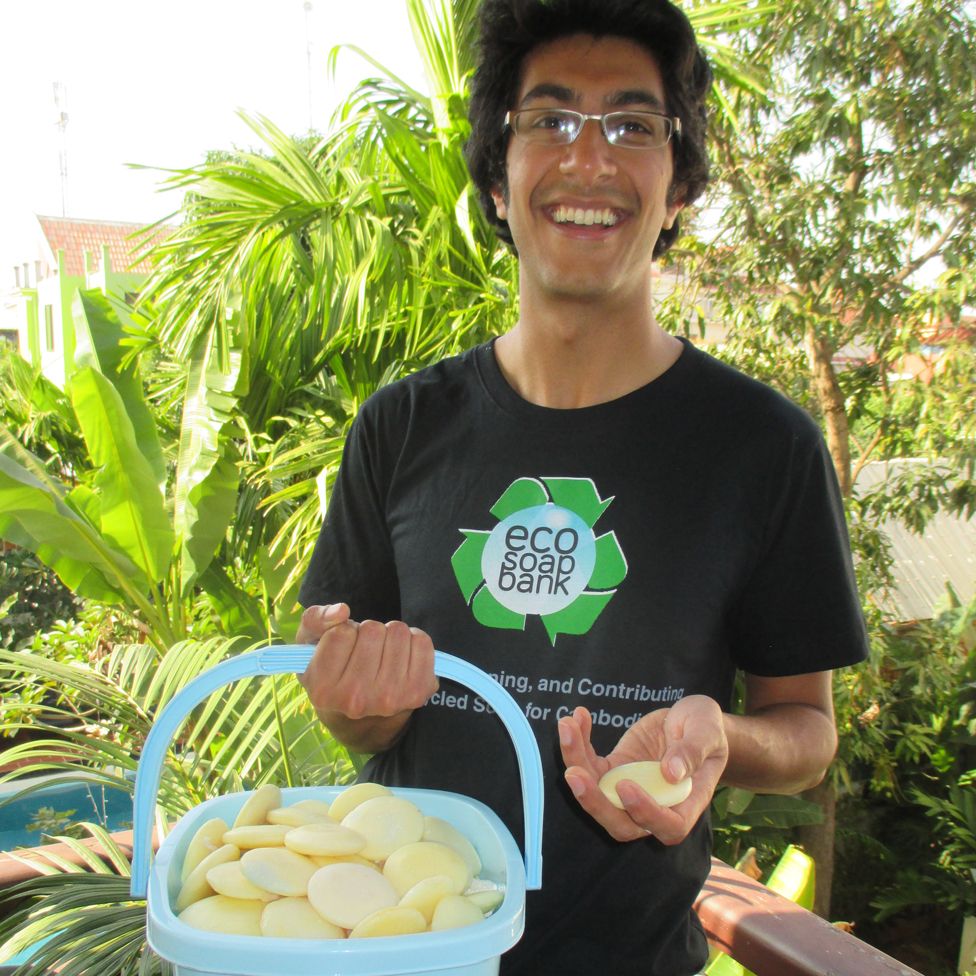The American student who gave Cambodian children a chance to get clean
- Published

When an American student saw a Cambodian woman washing her child with detergent, he was horrified. But then he thought of a place he could get large quantities of soap free of charge. Two years later, he's already supplying villagers with a safe way to keep clean, and also with jobs.
Samir Lakhani was spending the summer building fish ponds in a Cambodian village when he saw the mother scrubbing the young child with laundry washing powder.
He was devastated, he says. Detergent can harm the skin, and contains toxic chemicals that can cause itchy eyes and vomiting. Hygiene is important to prevent disease, but this was not the way to clean a human being.
"Immediately, to any Westerner, it was like - this process and practice needs to be rectified - we need to do something about that," he says.
Then something clicked. The NGO he was working for, while taking a break from his environmental studies course at the University of Pittsburgh, was based in Siem Reap - a thriving tourist hub a stone's throw from the magnificent, 800-year-old temples of Angkor, which draw more than two million visitors a year.
With over 500 hotels and guesthouses to service them, Siem Reap produces a lot of leftover soap.
"There is probably no better place on Earth to start soap recycling than Siem Reap," says Lakhani.
He returned immediately to his hotel room, determined to find a way to do it.
"I purchased meat cleavers and meat grinders and cheese graters. I turned the hotel room into a laboratory. We had bubbling cauldrons. I was probably put on the watch list," he says.
He mugged up on chemistry, reached out to scientist friends, and soon emerged with a technique for combining discarded bars of soap into a new composite bar of "eco-soap".
Find out more
- Listen to Saving Lives with Recycled Soap on Health Check on the BBC World Service
From there things grew rapidly.
First he went to hotel to hotel, asking for leftover soap. The NGO he was volunteering with - Trailblazer Cambodia Organization (TCO) - put him in touch with local students to help with soap production, and provided space for them to work.
Once back in Pittsburgh for his final year of studies, he started crowdfunding. Then he succeeded in obtaining sponsorship from major hotel chains, to enable him to train and pay soap makers.
"I didn't study at all, as you can imagine. I was focused on this," he says.
Lakhani nonetheless graduated last year and now divides his time between Cambodia and the US.
Two years after his eureka moment, his Eco-Soap Bank organisation employs 30 staff in three hubs across Cambodia, collects soap from 170 hotels, and has supplied 650,000 people with a safe way of getting clean.
Women sell eco-soap in villages, a "couple of hundred" schools are given it free of charge, and "hygiene ambassadors" from partner NGOs train the schoolchildren to wash their hands properly.
In many rural communities in Cambodia soap is seen as a luxury. While some people use detergent, others may only rub their skin with ash or soil. Handwashing is rarely more than pouring water over one hand, then the other.
This leads to a slew of illnesses, including parasites, lung infections, typhoid and diarrhoea.
"Diarrhoea is the number three killer of children in Cambodia," says Dr Nget Pises, a paediatrician with Angkor Hospital for Children in Siem Reap. Children miss school and infections pass through the family, preventing parents from working.
Soap can kill about 70% of bacteria, he says. Studies have shown that proper handwashing can reduce the instance of diarrhoea by 40-60%.
For the soap makers, Eco-Soap Bank also provides a way of making a living.
Channy, a 40-year-old mother, joined a few months ago. She had previously worked in a garment factory and a laundry, but finds recycling soap much less physically demanding.
She takes leftover hotel soap, slices away the outer layer of scum and cuts the bars into chunks. These are dunked into a chlorine solution for two minutes, then placed into a mould and pressed into a new bar of soap.
It's multi-coloured, heralding the fact it's made up of many different bars. It smells clean, a bit like a swimming pool, and with a note of jasmine tea. That's because she stirs in tea leaves, and occasionally flowers from the roadside by the workshop.
Some soap is also sold by village women.
"From a wasted product that was going to be thrown in the trash - we get it into the hands of a soap vendor in the community, that's going to be economically stimulating the village and creating income for themselves," says Lakhani.
Whatever else may change in the country, Lakhani remains confident that the future is bright for soap recycling in Siem Reap.
"If anything has held consistent in Cambodia, it's Angkor Wat tourism industry," he says. "People will come and they will generate the soap."
Listen to Saving Lives with Recycled Soap on Health Check on the BBC World Service